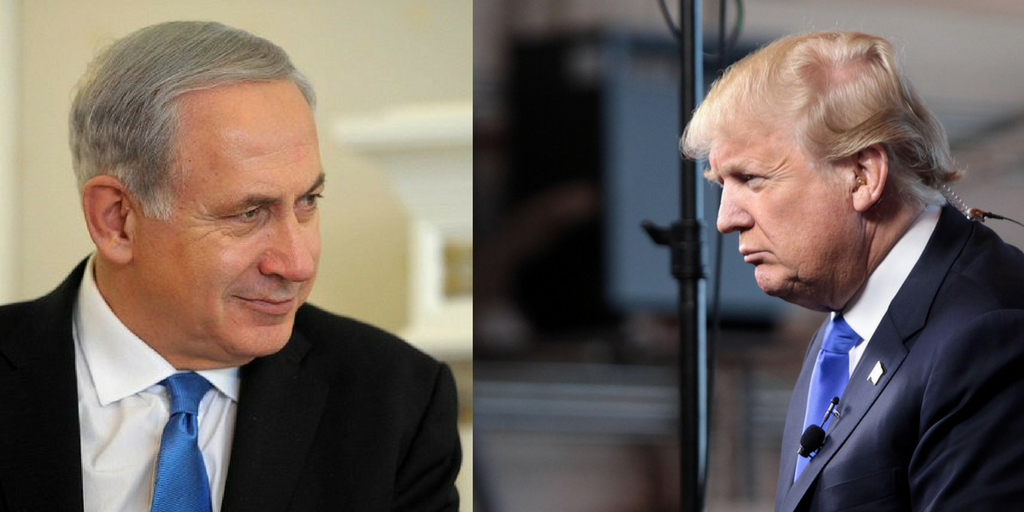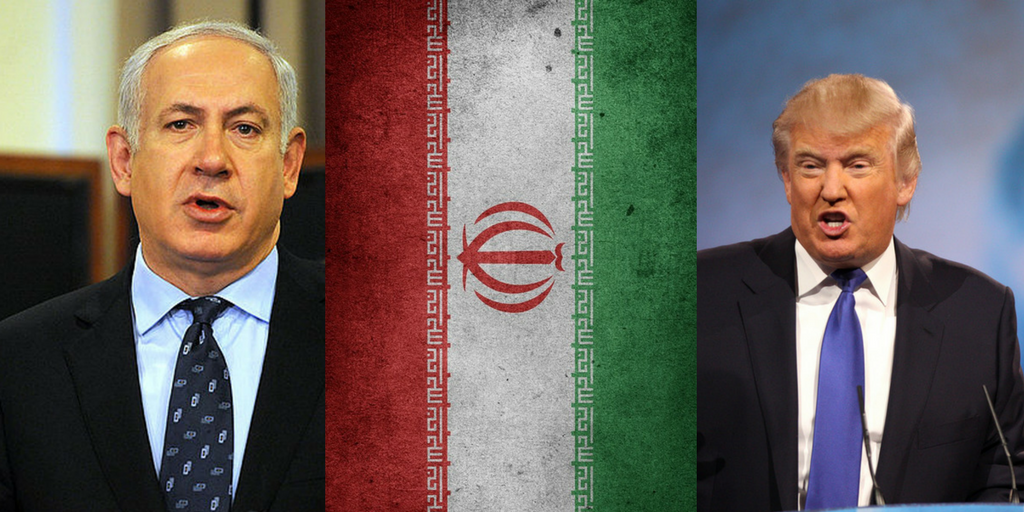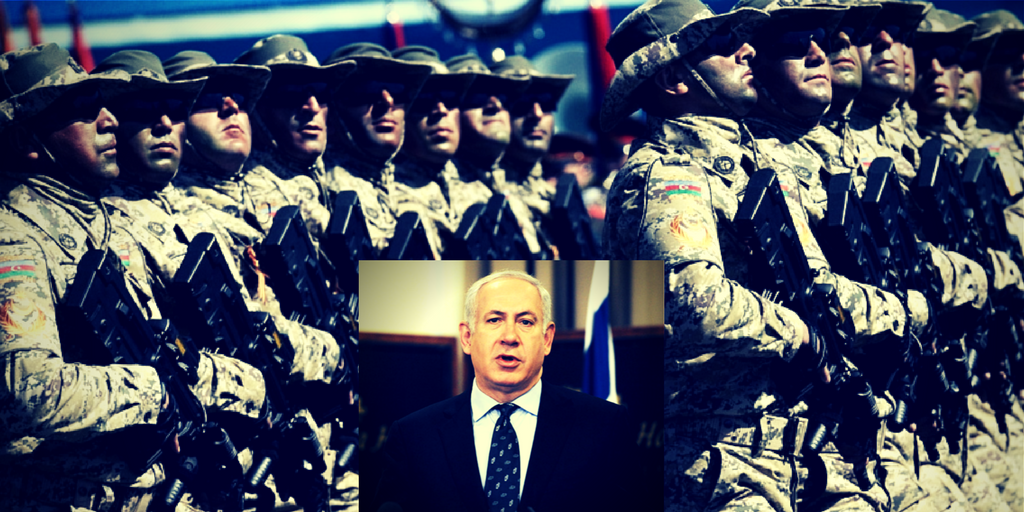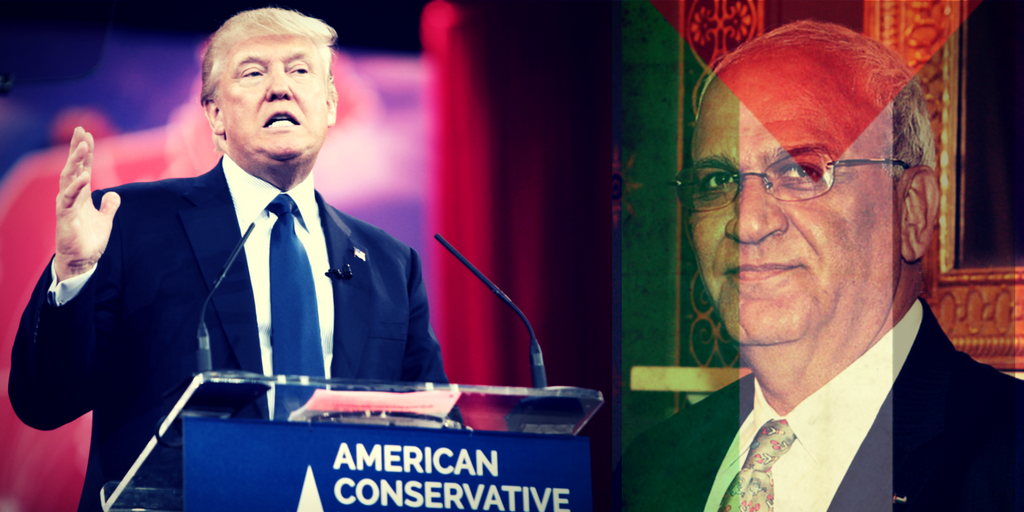The two-state model is widely viewed as the formula for Middle East peace. But the fact of the matter is that it makes peace impossible to achieve, by holding normal relations between Israel and its Arab neighbors hostage to grandiose peace deals.
When they met on Wednesday, US President Donald Trump and Prime Minister Benjamin were both walking wounded.
Netanyahu arrived in Washington the center of a criminal investigation the chief characteristic of which is that selected details of the probe are regularly leaked to the media by anonymous sources who cannot be challenged or held to account.
These anonymous sources, from inside the police and state prosecution, use hand-picked reporters who all share a visceral hatred of Netanyahu, to present a version of the probe to the public that besmirches Netanyahu and his family.
The prospect that Netanyahu may face indictment weakens his position in his party. Likud ministers, unsure of the future, but certain that they cannot challenge the credibility of unnamed sources without risking their own reputations and political futures, refuse to stand with Netanyahu and defend him. And so, with each additional anonymously sourced, incriminating story, the prime minister finds his political power diminished.
As for Trump, he met with Netanyahu two days after his loyal national security adviser, Lt.-Gen. (ret.) Michael Flynn, was forced to resign.
Flynn’s resignation was the culmination of a continuous campaign of defamation waged against him that began even before Trump was elected.
Flynn rose to national prominence in 2014 after then-president Barack Obama, who promoted him and appointed him to head the Defense Intelligence Agency, summarily fired him. Obama fired Flynn because the general opposed his nuclear deal with Iran, and opposed his supportive view of the Muslim Brotherhood, among other things. Since he was forced into early retirement, Flynn became an outspoken critic of the politicization of US intelligence agencies under the Obama administration.
The campaign against Flynn was based on highly classified information regarding conversations Flynn held with Russia’s ambassador to the US during the transition process in December. Under US law, intelligence agencies are prohibited from divulging the identity of US citizens whose conversations with foreign intelligence targets are intercepted.
The law is in place for good reason. As Eli Lake wrote in Bloomberg on Tuesday, “Selectively disclosing details of private conversations monitored by the FBI or NSA gives the permanent state the power to destroy reputations from the cloak of anonymity. This is what police states do.”
In the event, an FBI investigation of the conversations after they were leaked concluded that Flynn did nothing illegal in his dealings with the Russian ambassador. But criminalizing Flynn was never the object of the leaks – making him politically toxic was the aim. And it was accomplished on Monday when he resigned.
It appears likely that Trump became convinced that by sacrificing Flynn, he would end the insurrection US intelligence operatives are waging against his presidency. But as The New York Times made clear on Wednesday, the opposite is true.
Following Flynn’s resignation, the same intelligence sources that caused his downfall told sympathetic reporters that they have the top secret transcripts of conversations that other Trump staffers held with Russian regime officials. The fact that the transcripts indicate no wrongdoing on the part of any of Trump’s staffers is neither here nor there. The drumbeat of defamation will continue.
Flynn was the first target. But he will not be the last.
Selective leaks are not the only way that the permanent state intends to hamstring Trump. On Wednesday, The Wall Street Journal reported that US intelligence agencies are hiding intelligence from the White House.
On Thursday, without provocation or legal requirement, the FBI released records from a 45-year-old civil rights investigation of the Trump family’s real estate firm.
And of course, the decision by radical courts to block implementation of Trump’s executive order on immigration to the US from seven terrorism-stricken states shows that empowered political foes in the legal establishment intend to prevent him from governing.
To a certain degree, Trump’s first month in office bears a striking similarly to Netanyahu’s first term in office 20 years ago. When Netanyahu was first elected prime minister in 1996, he was an inexperienced politician. Before winning the election, Netanyahu had never held a cabinet level appointment.
Netanyahu, who opposed the phony peace process with the PLO, was viewed as the root of all evil by Israel’s security and legal establishment whose members had adopted the two-state formula as their catechism. After he was elected they joined forces to subvert his authority.
In 1997, the legal fraternity, in alliance with the media, alleged that Netanyahu’s decision to appoint Likud attorney Ronnie Bar-On attorney-general was the product of a criminal deal he cooked up with then-interior minister Arye Deri. In the fullness of time, the allegations were exposed as utterly groundless.
But at the time, they sufficed to torpedo Bar- On’s appointment. More important, the fake Bar-On scandal gave the legal fraternity the opportunity to turn the relationship between the attorney-general and the government on its head. Following the affair, the legal fraternity coerced a weakened Netanyahu to transfer the authority to select the attorney-general to the legal fraternity. Moreover, Netanyahu agreed to subordinate the government to the attorney-general’s legal decisions.
Then there was the security establishment. From the beginning the military establishment set out to block efforts by Netanyahu to diminish the centrality of the peace process with the PLO in Israel’s strategic planning. The fact that the security establishment was not faithfully serving Netanyahu and his government was exposed for all to see in September 1996, when the PLO-led Palestinian Authority launched a terrorist campaign against Israel following Netanyahu’s decision to order the opening of a subterranean tunnel spanning the walls of the Temple Mount.
Rather than taking responsibility for failing to either foresee or quell the terrorist offensive, Israel’s security brass blamed Netanyahu for the PLO’s murder spree.
Instead of standing up to the rebellious bureaucracies, Netanyahu caved in. Consequently, he lost his base, and in 1999 he lost his office.
In a way, Netanyahu had no choice. He had no allies with the power to help him. The Clinton administration was implacably opposed to him and worked openly with the Israeli deep state to unseat him. The media hated him even more than they hate him today.
Trump’s decision to allow Flynn to resign was a dangerous sign that he is beginning to follow the same pattern of behavior that led to the failure of Netanyahu’s first term.
But his press conference with Netanyahu on Wednesday signaled that Trump may yet turn things around and gain control over the rebellious bureaucracy by leaning on an ally that wants him to succeed and needs him to succeed in order to survive himself.
From the statements they made at the joint press conference, it is clear that Trump and Netanyahu have decided to build an alliance. Its purpose is twofold. First, by working together, they can defeat the common foes of their countries. And second, the success of their joint efforts will bring about the defeat of their bureaucratic enemies.
The most significant development to come out of the Trump-Netanyahu press conference was their refusal to endorse the two-state policy doctrine.
This was a necessary move.
The only way to build a working alliance between the US and Israel – as opposed to the declarative alliance that exists at public ceremonies – is for both leaders to abandon the two-state paradigm for policy- making.
The two-state formula has been the foundation of US Middle East policy for a generation. It has also been the foundation of the tribal identity of the Israeli Left – led by the military and legal fraternities and the media.
The two-state model is widely viewed as the formula for Middle East peace. But the fact of the matter is that it makes peace impossible to achieve, by holding normal relations between Israel and its Arab neighbors hostage to grandiose peace deals.
Even worse, the two-state model is based on an anti-Israel and anti-US assumption that makes it impossible for either to advance their strategic interests vis-à-vis the Islamic world.
The basic idea behind the two-state paradigm is that the establishment of a PLO state is a precondition for winning the war against Islamic terrorism.
So long as Israel refuses to cede sufficient territory to appease the PLO, victory will be impossible, because the absence of a PLO state so angers Muslims that they will continue killing their enemies.
The defeatist notion that “there is no military solution” to terrorism that dominates the American and Israeli strategic discourses is based on the two-state model.
Given that at the heart of the two-state model is the conviction that Israel is to blame for the presence of Islamic terrorism and extremism, and that the only way to proceed is to establish a terrorism- supporting PLO state, it naturally follows that the policy’s adherents in the US cannot see any real purpose for the US alliance with Israel. It is also natural that they fail to see any potential for a regional alliance led by the US and joined by Israel and the Sunni states based on the common goals of defeating Iran and radical Islamic terrorist enclaves.
In other words, the two-state formula dooms its adherents to strategic myopia and defeatism while holding their strategic and national interests hostage to the PLO.
The insanity at the heart of the two-state formula, and the US and Israeli public’s desire to make a clear break with the strategic defeats of the past generation, makes its abandonment a clear choice for both Trump and Netanyahu. Abandoning it wins them support and credibility from their political bases when they need their supporters to rally to their side. And to the extent they are able to implement more constructive policies to defeat the forces of radical Islam, they will weaken the establishments that are working to undermine them.
By leaning on Netanyahu to help him to secure victories against the forces of radical Islam, and so putting paid to the bureaucracy’s most beloved policy paradigm, Trump can both secure his base and weaken his opponents.
So, too, by developing a substantive alliance with the Trump administration and increasing Trump’s chance of political survival and success, Netanyahu gains a formidable partner and makes it more difficult for the legal fraternity and its media flacks to bring about his indictment and fall.
Amazingly then, to a significant degree, the survival of both leaders is tied up with their success in keeping their promises to their voters and defeating their foes – domestic and foreign.
Originally Published in the Jerusalem Post.
[huge_it_share]






